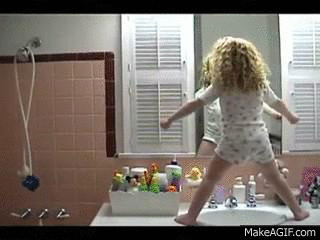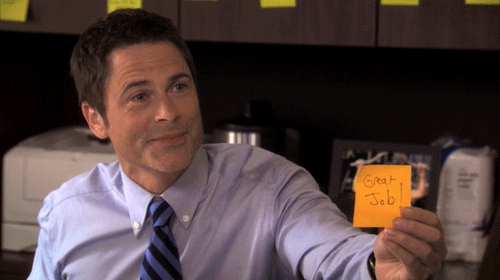
Stop Glossing Over the Good Stuff: How to Be More Positive
We’re not born as “glass half full” or “glass half empty” people. We make that choice each day. Here’s how to stop negativity and start being more positive.
As simple as it seems, taking the time to recognize the good stuff can have a huge positive impact on your relationships with colleagues, significant others, friends, and clients.

It’s easy to take a good thing for granted
As much as I hate to admit it, I’m kind of a shitty person by default.
With very few exceptions, nearly every part of my day goes off perfectly.
I wake up every morning without an alarm, next to a woman who makes me deeply happy. We playfully argue about whose turn it is to make coffee, cook breakfast and listen to Radiolab, and head to a local gym to get our day started.
My work schedule is flexible. The projects I work on are of my own choosing; I have the freedom to only take on tasks that are both extremely interesting and intensely satisfying.
Evenings are free to meet friends for drinks, or to have a slow dinner at some fantastic restaurant I read about somewhere.
Every so often I’m asked to speak at a conference, which means I get paid to travel to a cool city like Austin or San Francisco and share my ideas with people who love web design as much as I do.
I’m not telling you this to brag about how great my life is.
I’m trying to paint a picture of what an entitled asshole I can be.
Ask me how my day was
With all the great things I’m lucky enough to do on a regular basis, you might expect that I wear a permanent grin on my face and pour out gratitude at Niagara-esque volumes.
But if you asked me how my day was back in 2013, you’d probably hear something like:
- “It’s okay, I guess.”
- “Super busy. I’m so tired.”
- “It’d be better if ________ would finally ________.”
What an ungrateful dick, right?
“Are you actually complaining right now?”
One of my long-term clients is a company called Precision Nutrition. It’s run by Dr. John Berardi and Phil Caravaggio, and employs a good number of truly brilliant people, including my long-time friend Nate Green.

During a trip to Toronto for an all-hands PN meeting, JB, Phil, Nate, and I went out for dinner at a very cool Italian restaurant. We had an incredible family-style meal, and afterward we started talking about whatever was on our minds.
During the course of conversation, I made a couple negative comments about my life; essentially, I started complaining about my situation.
Phil looked me in the eye and asked, point blank, “Are you actually complaining right now?”
The question caught me off guard, because I was used to commiserating with other entrepreneurs about how “hard” our lives were and all the things we wished we could change.
Yet here was a fellow business owner staring at me like I just set the restaurant on fire.
“How many good things happened today?”
I started feeling foolish and fought the urge to start rambling in an attempt to backpedal. I decided the best thing I could do was try to steer into the skid.
“I guess I was, yeah.”
JB leaned in. “How many good things have happened to you today?”
My four-star hotel room and the day’s extremely successful meeting with PN flashed through my mind. I felt blood rushing to my cheeks.

“And how many bad things?”
I had to think pretty hard. I forgot toothpaste and had to call the front desk to get some. They sent peppermint, but I prefer spearmint. I had to wait in line for a taxi for, like, ten whole minutes.
I was acting like a colossal tool.
It’s easy to only focus on the negative things.
“We tend to forget all the good things that happen to us. I mean, why make a note of something that goes well?” Nate joined the conversation, and continued, “But if something goes wrong, that sticks out in our minds. So when we think about our days, just the negative stuff jumps out at us and we complain.”
JB smiled and said, “It’s a psychological default. We all do it.” He looked at Phil.
“Until we decide to stop doing it,” Phil continued.
JB swirled his wine and said, “This is going to feel silly, but list three good things about today. Out loud. Doesn’t matter what they are.”
I felt like a kid getting a lecture, but I knew they had all done this previously, so I played along.

“My hotel has a great shower, our meeting today has really good implications for my business, and this is one of the best Italian meals I’ve ever had.”
Phil beamed; he had picked the restaurant.
“It feels silly,” said JB, “but every time I find myself complaining, I immediately stop and list off three good things about my day.
“Over time I stopped complaining, partly because I felt silly having to stop mid-conversation to derail a complaint,” JB paused to make eye contact, “but mostly because I just don’t think of the negative stuff as often.”

Reprogramming my brain
In the weeks that followed, that conversation stuck with me. I was acutely aware of my negativity, and admonished myself publicly by stopping mid-complaint to apologize and list the day’s high points.
Most of our lives are full of creeping, incremental changes that we can’t really pinpoint; we start in one mindset, and over weeks or years we find that we’ve shifted, and now we have a different mindset, even though we didn’t notice the change.
This conversation was a hard, serious, overnight change. I can distinctly remember how I used to feel before taking this advice, and how I felt immediately after — it was like flipping a light switch that made me less of an ungrateful asshole, and more of a happy, fun-to-be-around person.
It didn’t take long for me to notice a significant drop in complaints. But that wasn’t the only thing that happened; I started to pay more attention to the positive things as well.
Don’t let the good go unnoticed

In my new effort to curb negativity, I started making “anti-complaints”.
- “I really like Dave. He’s such a happy guy.”
- “Our waitress was really excellent tonight.”
- “This project is going really smoothly.”
- “I’m so happy someone invented toast.”
These anti-complaints did more than realign my perception of the world, though; I started to see the people around me becoming more positive as well, which made for better experiences in both my professional and personal life.
Putting positivity into practice
Being positive doesn’t stop at making you sound less whiny at dinner: a positive outlook can be the catalyst for huge improvements in all areas of your life.
How to stay positive at work.
In a healthy workplace, you’ll be asked for feedback on projects — it’s inevitable that some of that feedback will be negative.
By taking the time to point out the good things your colleagues are doing, the negative feedback is less jarring.

Imagine a situation where you turn in projects to your boss, and she never says anything. Every project is accepted silently without any feedback.
Then a project gets rejected: your boss tells you all the things that are wrong with the project and sends you on your way to try again.
It doesn’t matter that every project before this one was accepted; the only feedback you’ve received from her has been negative.
However, in the exact same situation, if every accepted project had been accompanied with positive feedback — “great job on the layout”; “I love this sentence here”; “I really appreciate you getting this in on time” — the negative feedback wouldn’t have felt so jarring.
It would have been feedback as usual, working with you toward a better final product.
It’s not weak or overly emotional to tell someone you appreciate them. In fact, sharing positive feedback makes both people feel great, and creates a strong foundation that helps weather any rough patches.
How to stay positive at home.

I tell Marisa how much I like her probably a half-dozen times a day.
I try to remember to call out all the things I like about her, whether it’s her constant drive to improve herself, her unwillingness to accept that other people can do things she can’t, her ability to match my giant-bearded-toddler playfulness, or the fact that she can handle my so-coldly-logical-it’s-often-hurtful tendencies.
As a result, we can share frustrations with each other without worrying that the relationship is falling apart. When we argue, it’s not about whether or not we like each other; it’s just that one of us was supposed to get ready to leave, and was still sans-pants three minutes before we’re supposed to be out the door.
Even when it’s bad, it’s not that bad
If your partner makes a decision you disagree with, or a colleague shows you a project that you think needs work, it’s extremely important to remember that very few things are a total failure.
Try to start by acknowledging the effort that was put in, and listing any positive aspects. Remember whose team you’re on, and that everything can be fixed if you’re working together.
Next time in you’re in this position, try this experiment: don’t look at the project as a failure with salvageable parts; see it as a solid effort with room for improvement.
It’s a subtle difference, but it reframes the situation from a botched outcome to an obstacle in an otherwise pleasant journey.
Make sure to share the love
Positivity works best when it’s shared. The people around you can’t read minds, so even if you’re noticing all the things they do that you appreciate and admire, they’ll never know it unless you tell them.

If you make a habit of sharing all the good things, you become someone that makes the people around you more positive. You become a bright spot in people’s days. You create a vacuum where negativity cannot survive, because you don’t give it the chance to feed and grow.
My efforts to become more positive were immediately met with more positivity from the people around me: I talked about what I liked, and that encouraged others to talk about what they liked, and that made all of us feel better — a welcome break from the cycle of commiseration that I’d grown accustomed to.
Life is exactly as good (or as bad) as we choose to experience it
In the years since I’ve forced my brain to focus on — and share — the positive things in my life, I’ve seen a marked improvement in my relationships across the board. This has led to a better home life, a better workplace, and happier clientele.
All of these things have improved my happiness, made me more successful, and (I hope) made me more pleasant to spend time with.
I think it’s important to note that nothing else changed while these improvements were happening. I was living the same life, working the same job, spending my time with the same people.
The only thing that changed was the lens through which I chose to view my world.
Your turn: list 3 good things that happened today
You can change your life too, starting today. Share your experiences in the comments and tell me 3 good things that happened today.